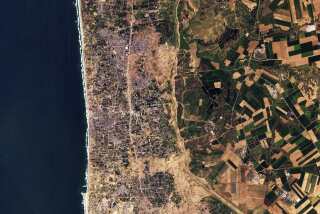NATO Credibility at Stake
- Share via
For months, armed ethnic Albanians have been stirring trouble in the buffer zone that separates Kosovo from Serbia. NATO forces policing the three-mile-wide area have done little to stop ethnic Albanians from converting the zone into a training camp for its guerrillas and a staging ground for armed forays into Macedonia.
Serbian soldiers moved into the buffer zone Wednesday under an agreement between NATO and Belgrade. Sending Serbs in to keep peace increases tension in the area and undermines NATO credibility. The ethnic Albanian guerrilla leaders operating in the zone agreed to a cease-fire but at the same time disclaimed control over their disorganized factions. The guerrillas are responsible for dozens of Serbian police and civilian casualties in the buffer zone, but more important, they are poisoning relations between neighbors and ethnic groups in the region.
Continued violence stoked by ethnic Albanians poses particular danger for adjacent Macedonia, where the gunmen have been fomenting unrest within the Albanian minority. Ethnic Albanians make up more than a quarter of Macedonia’s population and have learned to live with the Slavic majority. Insurgency by the Albanian militants threatens the delicate ethnic balance and could engulf the former Yugoslav republic in the next Balkan ethnic bloodletting. The Macedonian government is desperately urging NATO forces in Kosovo, which include 4,600 U.S. troops, to prevent the guerrillas from crossing the border, and for a good reason. In two days of fighting earlier this week, the guerrillas moved to within 12 miles of the Macedonian capital, Skopje.
Instead of curbing the ethnic Albanian insurgency, the presence of Serbian soldiers in the buffer zone may in fact increase the likelihood of violence and draw the North Atlantic Treaty Organization into a conflict--on the side of Serbia--against those it is there to protect: ethnic Albanians. The Albanian population harbors aspirations of one day becoming part of Greater Kosovo and deeply distrusts the unreformed Serbian military. Clearly, disarming the ethnic Albanian guerrillas and sealing the borders to stem the flow of arms are key priorities, but the job should be carried out by NATO troops.
More to Read
Sign up for Essential California
The most important California stories and recommendations in your inbox every morning.
You may occasionally receive promotional content from the Los Angeles Times.













